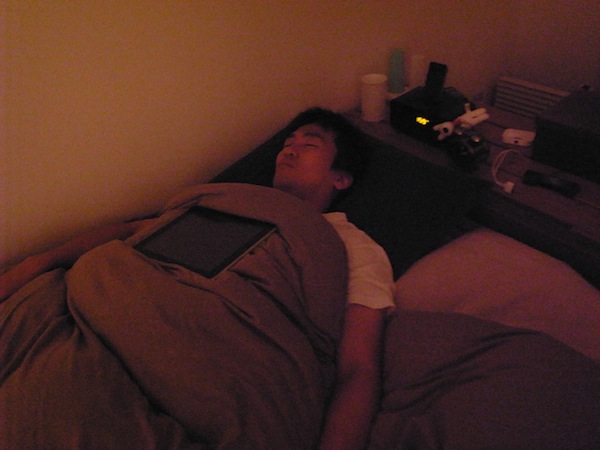Study: Using iPad For Two Hours Before Bedtime Harms Sleep


iPad use before bedtime can suppress normal nighttime release of melatonin, delaying sleep and altering the body’s circadian rhythm. A study from the Lighting Research Center at Rensselaer Polytechnic Institute found two hours with an iPad at its maximum brightness is enough to suppress the hormone melatonin which is a key hormone in the body’s clock, signaling night and triggering sleepiness. Other research, according to Scientific American, indicates that “if you do that chronically, for many years, it can lead to disruption of the circadian system,” sometimes with serious health problems.
Study lead Mariana Figueiro says the dose of light is important. Brightness, exposure time and wavelength all determine whether nighttime lighting affects melatonin release. Light in the blue-and-white spectrum—emitted by tablets, laptops and notebooks, can alter the release. In the study, subjects wore light-detector goggles during late-evening tablet use. The goggles detected light measurements that can hinder melatonin production by about 22 percent.
“If they are bright and they are big and are close to your eyes, they have more potential to disrupt your melatonin than the TV, which is usually farther way,” Figueiro said.
Meanwhile, smaller devices such as iPhones are less likely to affect circadian rhythms as they emit less light. Still, while they may not be depleting the body’s melatonin supply, they can still disrupt sleep by delaying bedtime.
WebMD offers four tips to use devices at night without altering sleep:
- Invest in a filter. Figueiro says inexpensive filters can not only turn down the glare, but also block melatonin-zapping blue light. Filters should ideally cut off wavelengths below 520 nanometers.
“You can still see the screen and do your task, although the color is compromised,” Figueiro said. - Dim the lights. Although study participants used tablets at full brightness, users certainly don’t have to.
“Use the automatic dimmer function at night,” Figueiro said. - Distance yourself from the tablet. Dr. Michael Breus explains that proximity is an issue with personal electronic devices. “When we use these devices, we hold them closer to our face than we would a TV or a computer,” he said.
- Impose an e-curfew. Because the devices are confusing the body’s natural inclination to identify morning and night, the disruption in circadian rhythms can affect learning among school-aged children.
“Impose an electronic curfew,” Breus said.
[Image via Flickr/mootoh]









































